Investing is a fundamental act for all people. You are investing your money when you buy something. You are investing your time and effort to your company you are working at. I think we all need to know about investment even if you are not a professional investor. So I picked up this book to read. Warren Buffett describes this book as the best book on investing ever written.
I’m now reading:
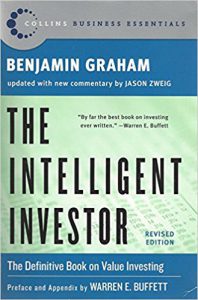
The Intelligent Investor: The Definitive Book on Value Investing, Revised Edition
by Benjamin Graham
Excerpts
‘The sillier the market’s behavior, the greater the opportunity for the business-like investor. Follow Graham and you will profit from folly rather than participate in it.’
‘Ben Graham… expressed to a friend the thought that he hoped every day to do “something foolish, something creative and something generous.”‘
from the “Preface to the Fourth Edition” by Warren E. Buffett
One of Graham’s principles:
‘The market is a pendulum that forever swings between unsustainable optimism (which makes stocks too expensive) and unjustified pessimism (which makes them too cheap). The intelligent investor is a realist who sells to optimists and buys from pessimists.’
from “A Note About Benjamin Graham” by Jason Zweig
| 2017/05/13
| Finance & Economics, Notes
|
The Buffetts of China
Warren Buffett has many fans in China but few true followers
from The Economist
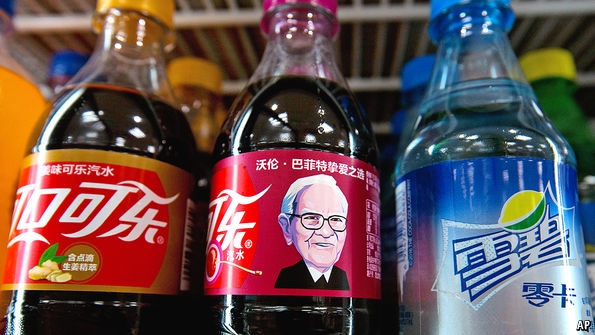
Chinese Buffetts (Buffett-like investors) are now in trouble and face a stiff test because of its hard-driving, debt-laden, risky approaches & unstable cashflow.
The government appears at last to be serious about cleaning up financial markets.
Xi Jinping has declared that the focus of financial policy should be on limiting risks.
The banking regulators are now choking off cashflows to shadow banks.
The risk to Chinese investors:
1) political risk
– The state is closing in on those it suspects of illegality.
– 2 Chinese Buffetts are now in detention: jailed for manipulating the stockmarket & investigated for corruption.
2) financial risk
– In clamping down on debt, regulators’ targets are the debt-laden investments favoured by China’s insurance upstarts.
– Both Fosun and Anbang have had to call off foreign deals in the past year.
More Buffett-like companies are big, boring, and humble mainly state-owned insurers.
Hewing to official rules, they have been more cautious about using debt.
Benefiting from China’s growth, their performance has topped Berkshire Hathaway’s over the past decade.
| 2017/05/10
| Finance & Economics, Summary
|
North Korea
How to deal with the world’s most dangerous regime
from The Economist
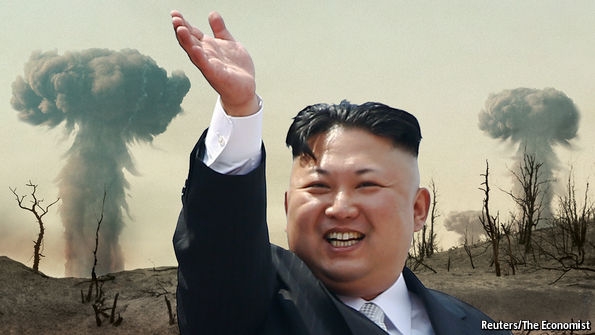
Kim Jong Un celebrated grandpa’s birthday on 4/15. The regime threatens enemies by nuclear destruction & is building a missile reaching US
Dealing with bellicose Kim Jong Un will be one of Mr Trump’s trickiest tasks & the first big test of how he handles relations with China
Wanting to do something quickly is emotionally appealing. Yet a pre-emptive strike would be reckless & could turn nuclear & kill millions
Creating the impression Trump might strike first is dangerous. If Kim were to believe, he might attack first. Trump should cool his rhetoric
Mr Kim sees his nuclear arsenal as a guarantee of his survival. Economic sanctions & cyber-attacks are ineffective. US needs China’s help
North Korea is China’s ally. China does not wish North Korea reunite with the South & does not want American troops on its border
To contain North Korea Mr Trump has to learn how to talk to China. His transactional approach is ineffective for diplomacy
America should strengthen the rules-based order and invite China to join it instead of letting China break the rules in exchange for help
He should talk about North Korea itself, not the yuan or US steel jobs, to persuade China that it is in its own interest to curb North Korea
Mr Trump should reassure JP & the South they remain under US’s protection & China his goal is not invasion but detering nuclear threat
If the North were to use its nukes, the regime would be obliterated. In the long run, reunification is inevitable and desirable
| 2017/04/28
| Politics
|
Japanese education
Why bullying in Japanese schools is especially traumatic
from The Economist
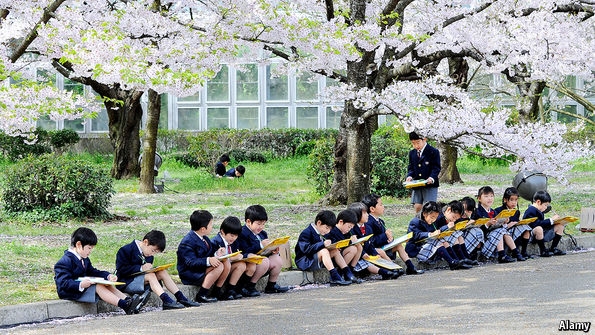
A boy from Fukushima was called “germ boy”, stolen his things, punched & kicked & thrown down the stairs by his new classmates in Yokohama
The boy was told to hand over any compensation his family may have received & gave them ¥1.5m which his family borrowed from their relatives
Bullying is intense in Japan. In 1986 a boy killed himself after months of mock funeral. Suicide is the biggest cause of death for teenagers
In Japan bullying is a group phenomenon & involves a big portion of a class inflicting psychological & physical torment on a single victim
Some say: “A characteristic of Japan is that you should not stand out”; “Pupils have to lead a collective life when they are at school”
School activities are organised in groups. Pupils must adhere to rules about uniforms or hairstyles & should “read the vibes,” kuuki wo yomu
OECD’s PISA test suggests that JP students are smart & diligent but don’t enjoy school much. JP schools are like “dysfunctional communities”
Teachers are not trained to spot bullying. There are few incentives to notice or deal with it. 12% of them have taken part in bullying
Local school boards have neglected the problem & even blamed the boy from Fukushima for handing over his family’s savings voluntarily
An anti-bullying law requires schools to report cases of bullying. (224,450 in 2015.) But they might underestimates the scale of the abuse
The law urges teachers to report bullying. But bullies are rarely punished: in 2014 there were 188,057 reported cases & just 2 suspensions
44% of gay teens were bullied last year. Teachers said the sexuality broke the harmony. 1/3 teachers think homosexuality is a mental illness
JP government said it would review its anti-bullying policies. Policymakers & teachers should recognise too much conformity plays a part
| 2017/04/27
| Politics
|
Corporate ambitions
Amazon, the world’s most remarkable firm, is just getting started
from The Economist
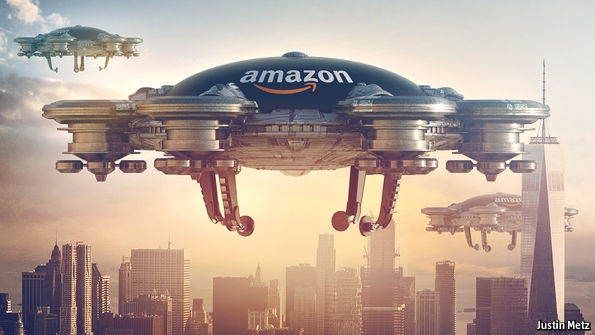
Amazon, the former bookseller, is now a leading provider of cloud computing, TV programs and original physical products include Amazon Echo
Since 2015 its share price has jumped by 173%. It’s the fifth-most-valuable firm. But 92% of its value is due to profits expected after 2020
Investors anticipate a rise in sales from $136bn to $500bn (2016-17). It will have to grow faster than any company to justify its valuation
Microsoft has cloud-computing ambitions; Walmart has $500bn revenues & online services. All depends on Bezos. How can he achieve this goal?
Amazon’s unusual approach 1) time: Amazon is resolutely focused on the distant horizon. Mr Bezos emphasises two businesses: e-commerce & AWS
The more customers use Amazon’s services, the more Amazon can invest in new services: two-hour shipping; streaming video and music; Alexa
So long as shareholders retain their faith in this model, Amazon will be able to keep spending, which will keep making it more powerful
2) the breadth of activities: logistics; search engines; SNS; foods; all types of medias. Stockmarkets apply a “conglomerate discount”
Amazon could be a new kind of utility, providing the infrastructure of commerce: AWS; warehouse; air-freight; payment system; drone delivery
For now, Amazon is unlikely to attract the attention of regulators b/c US’s antitrust enforcers look at its effect on consumers & pricing
But Amazon may be accused of using its clout as a digital platform to extend its power to adjacent businesses like Google in Europe
If it become a utility for commerce, the calls will grow for it to be regulated as one, which will bring it into conflict with government

Amazon’s stock price (2001-2017)
| 2017/04/02
| Business, Summary
|






